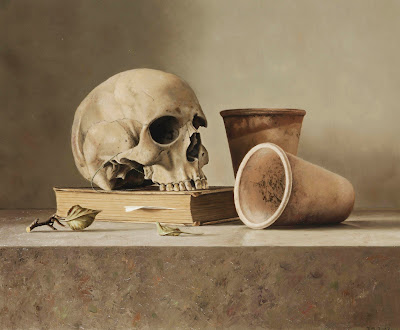THE VANITY OF THIS WORLD.
July 31, 2022.
Eighteenth Sunday in Ordinary Time – C.
Readings: Ecc 1:2; 2:21-23; Ps 90:3-4, 5-6, 12-13, 14 and 17;Col 3:1-5, 9-11; Lk 12:13-21.
“Take care to guard against all greed, for though one may be
rich, one’s life does not consist of possessions.” Luke 12:15
A Bantu proverb says: “Life is vanity.” And a Nepalese
proverb adds: “Vanity blossoms but bears no fruit.”
To be rich in what matters to God, here is the inner message
of the liturgy of this 18th Sunday in the Ordinary Time. Life in God requires
that we make of him our priority and that we price more the heavenly virtues
that the earthly things. Hoarding up treasure here below for ourselves and
forgetting heavenly realities is a kind of madness. And regrettably, many of us
are caught in the madness of accumulation and worldliness. Riches for us means
to own the whole world and all the created things. Many people breathe only
possessions, riches, and accumulation. But when our life ends, nothing of what
we toiled for goes below with us. Even though some are buried with golden
coffins and vested with pearls and expensive clothes, all these will only turn
into food for termites.
Today's readings sound a stern warning and a calling for you
and me to think of what really matters in this life and value it above all.
The wise man Qoheleth, in his poetic way, makes us sing:
“vanity of vanities! All things are
vanity!” And he is right in his observation. We give ourselves many hard times;
we undertake many hardships for material possessions, worldliness, and
pleasure. But then one day we die and nothing of all these things follows us in
the loneliness of the grave. Qoheleth questions, "For what profit comes to
man from all the toil and anxiety of heart with which he has labored under the
sun?" All our toils are meaningless and without profit if we toil without
God. God alone gives meaning to our efforts and if what we possess is used in
accord with his divine will then everything becomes meaningful. In conclusion,
what is done without God is vanity. What is done with God is meaningful.
St. Paul, therefore, in the second reading can make this
appeal: "If you were raised with Christ, seek what is above, where Christ
is seated at the right hand of God." As Christians, the things of heaven,
the divine virtues, and the will of God should be our priority. God above all.
"Put to death, then, the parts of you that are earthly: immorality,
impurity, passion, evil desire, and the greed that is idolatry. Stop lying to
one another..." And we may add, stop lying to yourself. Your money won't
save you; your power neither; nor the pleasure... All these are passing things.
If pleasure was enough for salvation Epicurus would still be alive. It is
idolatry and madness to rely on fleeting things.
The Lord Jesus, through the parable of the stupid rich man,
teaches us about the trap of materialism. We oftentimes think that having all
we need, heavily loaded wallets, and millions in our bank accounts are
assurances of a future. Some rely upon hereditary only. In giving the parable
of the rich man, the Lord tells us that we should rather price heavenly
realities for, the earthly ones' are useful until we are still alive. Once
dead, they go to another one who has not suffered to gain them. Thus, the
question to the rich man: “You fool, this night your life will be demanded of
you; and the things you have prepared, to whom will they belong?”
The parable, instead of being a condemnation of riches and
material possession, teaches us that there is a great contrast between our
human plans and the projects of God. Therefore, we should always be smart
enough to plan with God rather than alone and for ourselves. It is not an evil
thing to be rich or to work hard for material possessions. But the evil is when
we rely only on those material things for life and security. Life itself is
more than money. Love and friendship with the needy assure more heaven than
riches can assure life. How many rich people have died these two years of the
COVID-19 pandemic? Why could all their possession not save them?
I happened, in a discussion with one confrere to reflect on
the reality of this pandemic. The poor counties and the poor people seem to
have been less infected than the rich and developed or 1st World Countries
where sciences and medicine are more advanced. Despite all their possessions
and healthcare systems, they have died thousand and thousands. And that which
was their assurance, their possessions, belongs today to someone else or the
banks. This must teach us a life lesson. You are rich! Well! But life does not
depend only on your riches. It before all depends on God.





Comments
Post a Comment